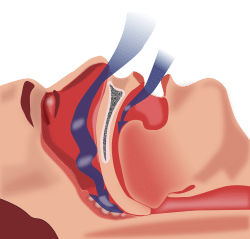When you stop breathing during sleep, your body is deprived of oxygen, which leads to serious health complications. our team of Physicians help you reclaim your sleep with CPAP machines, lifestyle adjustments, and mouth appliances.
If you suspect you have sleep apnea, contact the specialists at ENT Specialists of Austin online or over the phone at their Austin or Cedar Park, Texas locations.
Snoring & Sleep Apnea Q & A
What is Sleep Apnea?
Sleep apnea is a condition that causes you to breathe in a disruptive start-and-stop pattern while you sleep. Sleep apnea can result in dangerous side effects.
The three types of sleep apnea are:
- Obstructive sleep apnea: the throat relaxes and blocks airflow
- Central sleep apnea: problems with brain signals that control breathing
- Complex sleep apnea syndrome: a combination of both obstructive and central sleep apnea
What are the Symptoms of Sleep Apnea?
Another person might make you aware of the symptoms of sleep apnea before you notice them. For instance, they may notice that your breathing stops or that you snore loudly.
Other signs of sleep apnea include:
- Waking up unrested
- Dry mouth or sore throat
- Insomnia
- Morning headaches
- Sudden waking with shortness of breath
What are the Dangers of Untreated Sleep Apnea?
Sleep apnea isn’t just a problem with sleep. The disorder can affect your overall health and cause life-threatening complications without any treatment. The decreased oxygen and sleep disruptions associated with sleep apnea increase your risk for the following:
- High blood pressure
- Heart failure
- Heart attack
- Stroke
- Vehicle or workplace accidents
- Metabolic syndrome
- Type 2 diabetes
- Fatty liver disease
What Treatment Options are Available for Snoring and Sleep Apnea?
The first line of treatment usually involves lifestyle adjustments and continuous positive airway pressure (CPAP) machine, followed by surgery to correct obstructions.
- Lifestyle Adjustments: Obesity and smoking contribute to your sleep apnea risks, so your doctor may recommend weight loss and smoking cessation to reduce those risks. A mandibular splint may also help hold your airways open in mild sleep apnea cases.
- CPAP Machine: A CPAP machine connects to a face mask that you wear over your nose. The machine forces air into your nose or mouth while you sleep to override your abnormal breathing patterns.
- Inspire Hypoglossal Nerve Stimulator Implant: The innovative Inspire system delivers mild stimulation to the hypoglossal nerve, which controls the tongue and muscle motion in the airways of your body. This allows for healthy breathing as you sleep throughout the night.
- Surgery: If your condition doesn’t improve with lifestyle adjustments or a CPAP machine, you may be a candidate for surgery. The neck and throat surgeons at ENT Specialists of Austin provide the following surgeries –
- Septoplasty: corrects a deviated septum
- Turbinate reduction: trims down the soft structures inside your nose
- Polyp removal: cuts out growths inside nasal passages
- Tonsillectomy: removes tonsils
- Soft palate trim: removes tissues that cause vibration
- Expansion sphincter pharyngoplasty – a newer procedure to relocate throat muscles to open the airway
Consult with the experts at ENT Specialists of Austin for all your treatment options. Call or click now to make an appointment.
